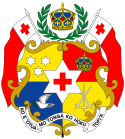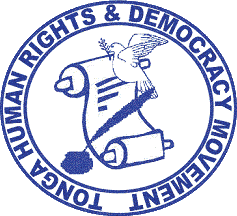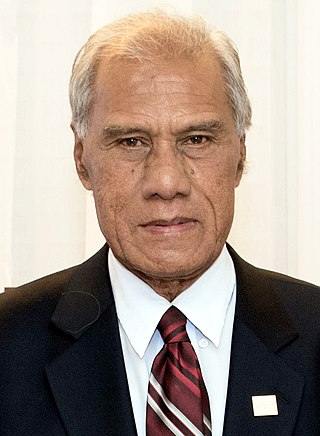 |
|---|
| Constitution |
| Administrative divisions |
General elections were held in Tonga on 1 May 1981. Seven nobles were elected by their peers, whilst a further seven People's Representatives were publicly elected.
 |
|---|
| Constitution |
| Administrative divisions |
General elections were held in Tonga on 1 May 1981. Seven nobles were elected by their peers, whilst a further seven People's Representatives were publicly elected.
Amid a record voter turnout, four of the seven incumbent People's Representatives were unseated. [1] Haʻapai MP ‘Uliti Uata was beaten by Pousima Afeaki; Tongatapu representatives Tomiteau Finau and Papiloa Foliaki were defeated by Joe Tuʻilatai Mataele and Sitili Tupouniua; and Vavaʻu MP Palavilala Tapueluelu was defeated by Ula Afuhaʻamango. [1]

The Human Rights and Democracy Movement (HRDM) is a political party in Tonga. Its leader is Uliti Uata. It states its ideology to be democracy, social justice, opposition to corruption, and women's rights.

Te Tai Tonga is a New Zealand parliamentary Māori electorate, returning one Member of Parliament to the New Zealand House of Representatives. It was established for the 1996 general election, replacing Southern Maori. It covers all of the South Island, Stewart Island, the Chatham Islands, and parts of both Wellington City and the Hutt Valley. The current MP for Te Tai Tonga is Tākuta Ferris of Te Pāti Māori.

General elections were held in Tonga on 23 and 24 April 2008 to elect members of the Legislative Assembly. The nobles were elected on 23 April, and the nine people's representatives on 24 April. A total of 32,000 people turned out to vote, giving a turnout of 48%.

Samiuela ʻAkilisi Pōhiva was a Tongan pro-democracy activist and politician. A key leader of the Democratic Party of the Friendly Islands (DPFI), he served as the Prime Minister of Tonga from 2014 to his death in 2019. He was only the fourth commoner to serve as Prime Minister, and the first commoner to be elected to that position by Parliament rather than appointed by the King.

Early general elections under a new electoral law were held in Tonga on 25 November 2010. They determined the composition of the 2010 Tongan Legislative Assembly.

The Cabinet of Tonga is the cabinet of the government of the Kingdom of Tonga. It is composed primarily of the ministers of government. The latter, including the Prime Minister, are appointed by the monarch. The Governor of Ha'apai and the Governor of Vava'u also serve on the Cabinet ex officio. When in session and presided over by the monarch, the Cabinet is known as the Privy Council.

The 2010 Tongan Legislative Assembly was established following the 2010 elections, the first under a new system which saw the majority of seats elected by universal suffrage. The Taimi Media Network described it as "Tonga's first democratically elected Parliament".
Kaveinga Faʻanunu was a Tongan politician

General elections were held in Tonga on 7 May 1984. Nine nobles were elected to the Legislative Assembly by their peers, whilst a further nine People's Representatives were publicly elected. All candidates were independents.
Tongatapu 9 is an electoral constituency for the Legislative Assembly in the Kingdom of Tonga. It was established for the November 2010 general election, when the multi-seat regional constituencies for People's Representatives were replaced by single-seat constituencies, electing one representative via the first past the post electoral system. It is a rural constituency located in the south-east of the island of Tongatapu, and covers the villages of Tatakamotonga, Holonga, ʻAlakifonua, Pelehake, Toloa, Fuaʻamotu, Nakolo, Haʻasini, Hamula, Lavengatonga, Fatumu and Haveluliku.
Niuas is an electoral constituency which sends one representative to the Legislative Assembly of Tonga. It covers the islands of Niuafoʻou and Niuatoputapu.
Tongatapu 1 is an electoral constituency for the Legislative Assembly in the Kingdom of Tonga. It was established for the November 2010 general election, when the multi-seat regional constituencies for People's Representatives were replaced by single-seat constituencies, electing one representative via the first past the post electoral system. Located on the country's main island, Tongatapu, it encompasses the villages of Kolomotuʻa, Tongataʻeapa, Tufuenga, Sopu-ʻo-Taufaʻahau, ʻIsileli, Halaʻo vave, Tuʻatakilangi, Longolongo, Vaololoa, and Kapeta.
Tongatapu 2 is an electoral constituency for the Legislative Assembly in the Kingdom of Tonga. It was established for the November 2010 general election, when the multi-seat regional constituencies for People's Representatives were replaced by single-seat constituencies, electing one representative via the first past the post electoral system. Located on the country's main island, Tongatapu, it encompasses part of Kolofoʻou, and the villages of Fanga-ʻo-Pilolevu, Mailetaha, Haveluloto, Tofoa, and Koloua.
Tongatapu 3 is an electoral constituency for the Legislative Assembly in the Kingdom of Tonga. It was established for the November 2010 general election, when the multi-seat regional constituencies for People's Representatives were replaced by single-seat constituencies, electing one representative via the first past the post electoral system. Located on the country's main island, Tongatapu, it encompasses parts of Kolofoʻou and Maʻufanga, and the entirety of the villages of Pahu, ʻAmaile, Fasi-moe-afi-ʻa-Tungi, Ngeleʻia, Mataika, and Halaleva.
Vavaʻu is an electoral constituency which sends two representatives to the Legislative Assembly of Tonga. It covers the eponymous region and island chain.
Niua 17 is an electoral constituency for the Legislative Assembly in the Kingdom of Tonga. It was established for the November 2010 general election, when the multi-seat regional constituencies for People's Representatives were replaced by single-seat constituencies, electing one representative via the first past the post electoral system. It encompasses the entirety of the Niua island group, for which it is the sole constituency. Thus, although it is technically a new constituency, it corresponds exactly to the former Niuas constituency, which also elected a single representative.

General elections were held in Tonga on 27 November 2014. All twenty-six elected seats in the single-chamber Legislative Assembly were up for election, although the monarch, acting on the advice of his Prime Minister, retains the possibility to appoint members to Cabinet from outside Parliament, thus granting them a non-elected ex officio seat in Parliament.
Tongatapu 7 is an electoral constituency for the Legislative Assembly in the Kingdom of Tonga. It was established for the November 2010 general election, when the multi-seat regional constituencies for People's Representatives were replaced by single-seat constituencies, electing one representative via the first past the post electoral system. Located on the country's main island, Tongatapu, it encompasses the villages of Pea, Tokomololo, Haʻateiho, Lotohaʻapai, and part of Tofoa and Koloua.
ʻEua 11 is an electoral constituency for the Legislative Assembly in the Kingdom of Tonga. It was established for the November 2010 general election, when the multi-seat regional constituencies for People's Representatives were replaced by single-seat constituencies, electing one representative via the first past the post electoral system. It covers the whole of the island of ʻEua, and the much smaller adjacent island of Kalau. Despite the "11" in its name, there is only one constituency for ʻEua; each constituency in the country is given a number.

General elections were held in Tonga on 18 November 2021 to elect 17 of the 26 seats in the Legislative Assembly.